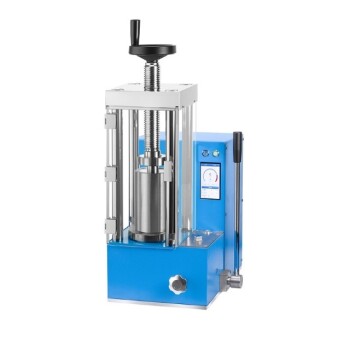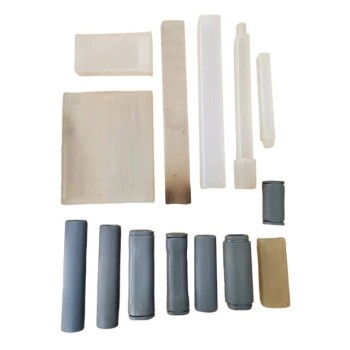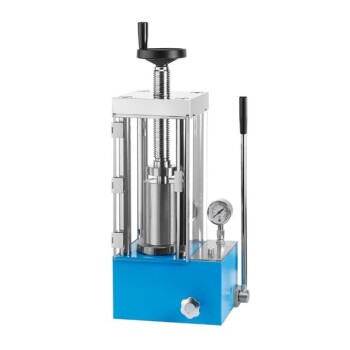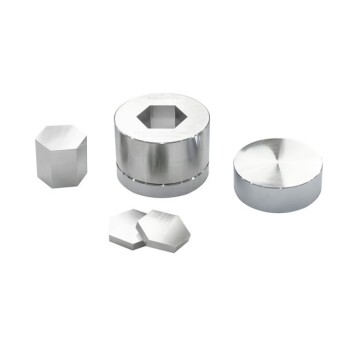At a glance, Cold Isostatic Pressing (CIP) is a critical manufacturing process for components used in the aerospace, automotive, electronics, telecommunications, chemical processing, and advanced energy industries. Its unique ability to create highly uniform and dense parts from powdered materials makes it indispensable for applications where performance and reliability are non-negotiable.
The core reason these demanding industries rely on CIP is its ability to produce components with superior material integrity. By applying equal pressure from all directions, CIP eliminates internal voids and creates a level of density and uniformity that conventional manufacturing methods cannot achieve.

What is Cold Isostatic Pressing (CIP)?
Cold Isostatic Pressing is an advanced manufacturing technique used to compact powdered materials into a solid, cohesive mass before the final heating (sintering) stage.
The Basic Process
A flexible mold is filled with a powder, such as a ceramic or metal. This mold is then sealed and submerged in a fluid within a high-pressure chamber.
The fluid is pressurized, exerting uniform force on the mold from all directions. This isostatic pressure compacts the powder into a highly dense "green" part with consistent properties throughout.
Why Uniform Pressure Matters
Unlike traditional uniaxial pressing (pushing from one or two directions), CIP eliminates the density variations and internal stress points that can lead to part failure. This results in components with exceptional strength, reliability, and predictable performance.
Why These Industries Rely on CIP
The properties achieved through CIP directly address the core challenges faced by high-technology sectors. Each industry leverages a specific benefit of the process.
Aerospace & Automotive: Uncompromising Reliability
In these safety-critical industries, components must withstand extreme temperatures, pressures, and mechanical stress. The high, uniform density from CIP minimizes internal flaws, drastically reducing the risk of catastrophic failure in parts like turbine blades or engine components.
Electronics & Telecommunications: Material Purity and Consistency
For advanced electronics, even microscopic variations in a material's density can alter its electrical or thermal properties. CIP produces components, like ceramic insulators or substrates, with perfectly isotropic (uniform in all directions) properties, ensuring consistent and reliable electronic performance.
Advanced Energy & Chemical Processing: Complex Shapes and Resistance
CIP is instrumental in forming the complex shapes required for next-generation technologies like solid-state batteries and advanced fuel cells. The high density also creates components, like isotropic graphite, that are highly resistant to chemical corrosion and thermal shock, which is vital in chemical processing environments.
Understanding the Limitations
While powerful, CIP is not a universal solution. Understanding its limitations is key to using it effectively.
Not for Simple, High-Volume Parts
For simple geometric shapes that do not require maximum density or uniformity, traditional press-and-sinter methods are often faster and more cost-effective. CIP is specialized for high-performance applications where its benefits justify the process complexity.
Tooling and Cycle Time
The "wet bag" CIP process involves manually loading and unloading the molds, which can result in longer cycle times compared to automated pressing. While "dry bag" CIP offers more automation, the initial tooling investment can be significant.
Making the Right Choice for Your Application
The decision to use CIP should be driven by the specific performance requirements of the final component.
- If your primary focus is maximum reliability under extreme stress: CIP is the superior choice for creating flaw-free, high-strength components for aerospace or automotive applications.
- If your primary focus is uniform material properties for complex electronics: CIP provides the isotropic density needed for predictable electrical and thermal performance.
- If your primary focus is producing intricate shapes for new technologies: CIP is a key enabler for manufacturing the complex geometries required in advanced energy storage and other cutting-edge fields.
Ultimately, adopting CIP is a strategic decision to prioritize component integrity and performance over all other considerations.
Summary Table:
| Industry | Key Applications | Benefits of CIP |
|---|---|---|
| Aerospace & Automotive | Turbine blades, engine components | High strength, reliability, flaw reduction |
| Electronics & Telecommunications | Ceramic insulators, substrates | Uniform properties, consistent performance |
| Advanced Energy & Chemical Processing | Solid-state batteries, isotropic graphite | Complex shapes, corrosion resistance |
Enhance your laboratory's capabilities with KINTEK's advanced lab press machines, including automatic lab presses, isostatic presses, and heated lab presses. We specialize in serving industries that demand high-performance components, offering superior material integrity and reliability. Contact us today to discuss how our solutions can meet your specific needs and drive innovation in your projects!
Visual Guide

Related Products
- Electric Lab Cold Isostatic Press CIP Machine
- Electric Split Lab Cold Isostatic Pressing CIP Machine
- Automatic Lab Cold Isostatic Pressing CIP Machine
- Lab Isostatic Pressing Molds for Isostatic Molding
- Manual Cold Isostatic Pressing CIP Machine Pellet Press
People Also Ask
- What is the specific function of a Cold Isostatic Press (CIP)? Enhance Carbon Inoculation in Mg-Al Alloys
- What are some examples of applications for cold isostatic pressing? Boost Your Material Performance with Uniform Compaction
- What is the standard procedure for Cold Isostatic Pressing (CIP)? Master Uniform Material Density
- Why is a Cold Isostatic Press (CIP) required for the formation of Nb-Ti alloy green compacts? Ensure Density Uniformity
- What industries benefit from Cold Isostatic Pressing technology? Ensure Reliability in Aerospace, Medical, and More



















